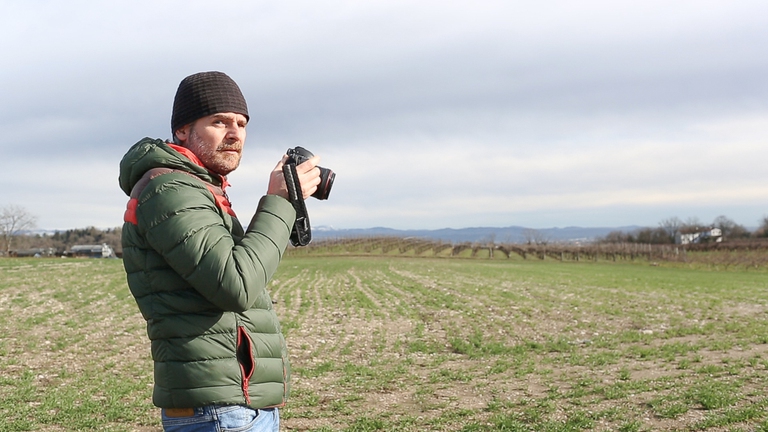
Senza una decisione da parte dei governi sul glifosato, la Commissione europea ha prolungato l’autorizzazione all’uso dell’erbicida per altri 18 mesi.
A photographer decided to dig into how, where and why the weed killer glyphosate is used in Italy. This is after he saw Ernesto Piovano’s photo feature, El Costo Humano de los Agrotoxicos (the Human Cost of Agrotoxins), which shows the health conditions of Argentinians who live and work in close contact with glyphosate. Piovano’s
A photographer decided to dig into how, where and why the weed killer glyphosate is used in Italy. This is after he saw Ernesto Piovano’s photo feature, El Costo Humano de los Agrotoxicos (the Human Cost of Agrotoxins), which shows the health conditions of Argentinians who live and work in close contact with glyphosate. Piovano’s work was presented during the 2015 edition of the Ethical Photography Festival in Lodi, Italy.
Massimo Colombo, professional photographer from Lecco, Italy, who has been collaborating with Getty Images since 2010, realised an investigation into glyphosate (available on YouTube). It’s the first of its kind in Italy and is aimed at understanding the extent of the weed killer’s use. Why do some farmers and winemakers still use it while others decided not to? “I started my investigation in the province of Verona, which is characterised by an extensive use of weed killers,” said Colombo. “I then travelled to Tuscany, where a vast area of ‘biodistricts’ (where farmers come together and decide to cultivate adjacent fields following organic practices) is being created. Lastly, I went to Abruzzo, where I had the chance to talk with a doctor who has been studying environmental diseases for years”.
“I came into contact with people who propose alternatives to chemicals in farming. I took pictures of every person I met and interviewed them. The result is a video explaining what glyphosate is, what its negative effects on human health and the environment are, and why many farmers want it to be banned”.
The debate on the use of glyphosate is evermore heated. It has even generated a disagreement between the International Agency for Research on Cancer (IARC, part of the World Health Organisation) and the European Food Security Authority (EFSA). The former has classified glyphosate as “probably carcinogenic to human health”. Following this, campaigners and political parties started their fight to get it banned. A battle reminiscent of the one – carried out by Rachel Carson, among others, with Silent Spring (1962) – against the pesticide DDT, which was banned in the 1970s.
“If we eat food containing pesticides and herbicides every day – even in low doses – we will face toxic effects on our genes in the long term. From here the question of carcinogenicity emerges,” says Doctor Maurizio Proietti, President of the Association of Health Studies and Information (ASSIS).
“Agriculture no longer has the ability of storing and developing soil’s organic substances. This is mainly due to herbicide use”. Herbicides turn soil “into an inanimate thing,” says Doctor Giovanni Beghini, President of Doctors for the Environment (ISDE) in Verona, Italy. This is the very opposite of what happens in practices that respect nature, namely organic and biodynamic farming.
Coalitions and campaigns aimed at stopping glyphosate are on the rise. LifeGate joined the Italian coalition #StopGlifosato: “We’ve been promoting sustainable farming for years, and this is a confirmation of our commitment. We want the European Commission to ban glyphosate,” said LifeGate CEO Enea Roveda.
The European Commission was set to make a decision on the issue on the 8th of March, when a new 15-year authorisation was expected. But pressures from the general public roused doubts among Brussels’ bureaucrats, which postponed the decision to June, when the current license expires. Meanwhile people, workers, communities and local entities are beginning to acting autonomously by favouring glyphosate-free economic and production systems. The health of people and the environment can wait no longer.
Siamo anche su WhatsApp. Segui il canale ufficiale LifeGate per restare aggiornata, aggiornato sulle ultime notizie e sulle nostre attività.
![]()
Quest'opera è distribuita con Licenza Creative Commons Attribuzione - Non commerciale - Non opere derivate 4.0 Internazionale.
Senza una decisione da parte dei governi sul glifosato, la Commissione europea ha prolungato l’autorizzazione all’uso dell’erbicida per altri 18 mesi.
The Transatlantic Trade and Investment Partnership (TTIP) is a free trade agreement between the United States (US) and European Union (EU). The two countries have been negotiating – mostly in secret – since 2013, after more than a decade of preliminary talks. The treaty aims to create a common market to facilitate economic relations between
Glyphosate is likely to be licensed for another 9 years. The authorisation period initially suggested was 15 years, but the European Parliament recently asked for 7. So this is the compromise found by the European Commission on the new authorisation – the existing one will expire in June – for the use of glyphosate in 28
The International Rebellion took place in 60 cities around the world between 7 and 20 October 2019. Extinction Rebellion activists tell their stories from London, at the heart of the radical, nonviolent environmental movement.
The message Emmanuel Macron had sent on climate change started circulating (again) after his election as French president. Here’s the video.
Seeds of Freedom is the new song of French musician and singer-songwriter of Spanish origin Manu Chao, dedicated to the fight that farmers and peasants are carrying out against agrochemical giant Monsanto, and in support to the International Monstanto Tribunal. On 18 April the Monsanto Tribunal, an international civil society initiative to hold Monsanto accountable for
An inconvenient sequel: truth to power è il nuovo documentario di Al Gore dopo Una scomoda verità. Il trailer ufficiale è finalmente disponibile.
La sequenza, contenuta in un episodio della serie della Bbc Planet Earth II, è già ritenuta una delle scene più belle nella storia dei documentari.
Before the flood è incentrato sulla più grande minaccia che il nostro pianeta si trova a dover fronteggiare: i cambiamenti climatici.










